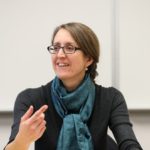This course develops foundations for bioethical inquiry in view of the doctrine of creation, the nuptial anthropology proposed by John Paul II, and seminal documents from the recent magisterium of the Church. The course provides theological, historical-cultural, and biological context for reflection on particular issues, drawing also on the contributions of recent thinkers including Robert Spaemann, Hans Jonas, and Stephen Talbott, whose work exposes the dualism and materialism that have shaped modern science and medicine, and points the way to a more adequate vision of the embodied person amid the vicissitudes of birth, illness, and death. Specific bioethical issues are treated in JPI 619: Life, Death, and the Human Person. (JPI 548: Fundamental Moral Theology: Freedom and Human Actionis highly recommended as a background.)
Selected Texts
Annie Dillard, Pilgrim at Tinker Creek.
Robert George and Christopher Tollefsen, Embryo: A Defense of Human Life.
John Paul II, Man and Woman He Created Them: A Theology of the Body.
Hans Jonas, The Phenomenon of Life.
Leon Kass, Toward a More Natural Science.
Evelyn Fox Keller, Refiguring Life: Metaphors of Twentieth-Century Biology.
Flannery O’Connor, Mystery and Manners: Occasional Prose.
Joe Sachs, Aristotle's Physics: A Guided Study.
Angelo Scola, The Nuptial Mystery.
Faculty

Lesley Rice
Assistant Professor of Bioethics
Dr. Rice received her doctorate in theology from the Pontifical John Paul II Institute with a dissertation on contemporary Catholic thought concerning biotechnology and the beginning of life. Her research concerns the history and philosophy of biology, the character of biological knowing, and the cultural and anthropological significance of biotechnologies.
Learn More